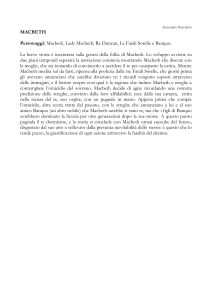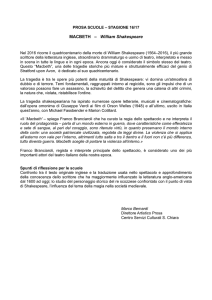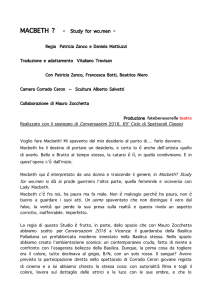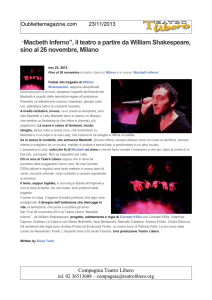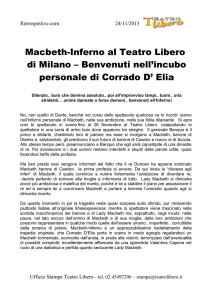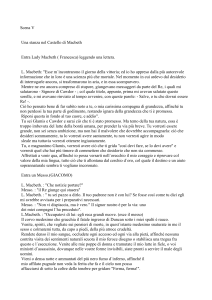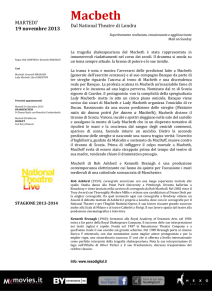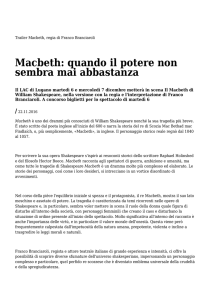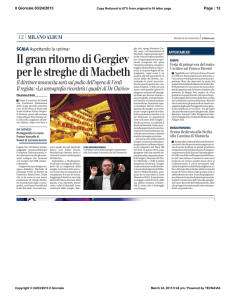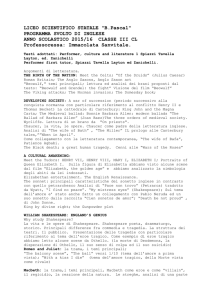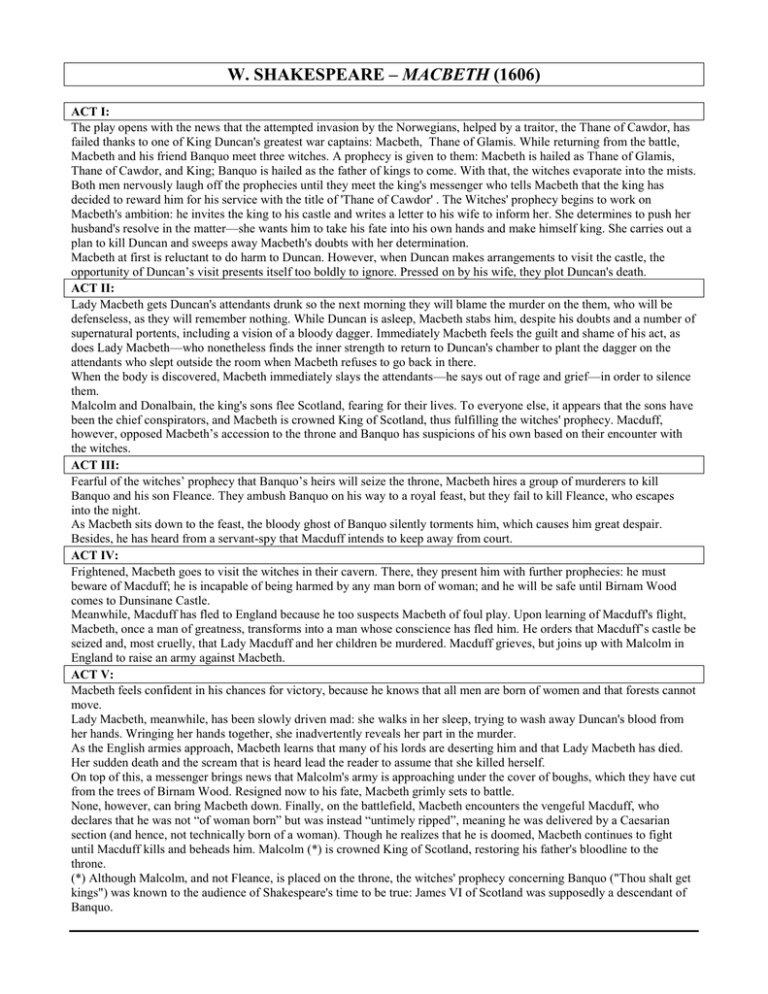
W. SHAKESPEARE – MACBETH (1606)
ACT I:
The play opens with the news that the attempted invasion by the Norwegians, helped by a traitor, the Thane of Cawdor, has
failed thanks to one of King Duncan's greatest war captains: Macbeth, Thane of Glamis. While returning from the battle,
Macbeth and his friend Banquo meet three witches. A prophecy is given to them: Macbeth is hailed as Thane of Glamis,
Thane of Cawdor, and King; Banquo is hailed as the father of kings to come. With that, the witches evaporate into the mists.
Both men nervously laugh off the prophecies until they meet the king's messenger who tells Macbeth that the king has
decided to reward him for his service with the title of 'Thane of Cawdor' . The Witches' prophecy begins to work on
Macbeth's ambition: he invites the king to his castle and writes a letter to his wife to inform her. She determines to push her
husband's resolve in the matter—she wants him to take his fate into his own hands and make himself king. She carries out a
plan to kill Duncan and sweeps away Macbeth's doubts with her determination.
Macbeth at first is reluctant to do harm to Duncan. However, when Duncan makes arrangements to visit the castle, the
opportunity of Duncan’s visit presents itself too boldly to ignore. Pressed on by his wife, they plot Duncan's death.
ACT II:
Lady Macbeth gets Duncan's attendants drunk so the next morning they will blame the murder on the them, who will be
defenseless, as they will remember nothing. While Duncan is asleep, Macbeth stabs him, despite his doubts and a number of
supernatural portents, including a vision of a bloody dagger. Immediately Macbeth feels the guilt and shame of his act, as
does Lady Macbeth—who nonetheless finds the inner strength to return to Duncan's chamber to plant the dagger on the
attendants who slept outside the room when Macbeth refuses to go back in there.
When the body is discovered, Macbeth immediately slays the attendants—he says out of rage and grief—in order to silence
them.
Malcolm and Donalbain, the king's sons flee Scotland, fearing for their lives. To everyone else, it appears that the sons have
been the chief conspirators, and Macbeth is crowned King of Scotland, thus fulfilling the witches' prophecy. Macduff,
however, opposed Macbeth’s accession to the throne and Banquo has suspicions of his own based on their encounter with
the witches.
ACT III:
Fearful of the witches’ prophecy that Banquo’s heirs will seize the throne, Macbeth hires a group of murderers to kill
Banquo and his son Fleance. They ambush Banquo on his way to a royal feast, but they fail to kill Fleance, who escapes
into the night.
As Macbeth sits down to the feast, the bloody ghost of Banquo silently torments him, which causes him great despair.
Besides, he has heard from a servant-spy that Macduff intends to keep away from court.
ACT IV:
Frightened, Macbeth goes to visit the witches in their cavern. There, they present him with further prophecies: he must
beware of Macduff; he is incapable of being harmed by any man born of woman; and he will be safe until Birnam Wood
comes to Dunsinane Castle.
Meanwhile, Macduff has fled to England because he too suspects Macbeth of foul play. Upon learning of Macduff's flight,
Macbeth, once a man of greatness, transforms into a man whose conscience has fled him. He orders that Macduff’s castle be
seized and, most cruelly, that Lady Macduff and her children be murdered. Macduff grieves, but joins up with Malcolm in
England to raise an army against Macbeth.
ACT V:
Macbeth feels confident in his chances for victory, because he knows that all men are born of women and that forests cannot
move.
Lady Macbeth, meanwhile, has been slowly driven mad: she walks in her sleep, trying to wash away Duncan's blood from
her hands. Wringing her hands together, she inadvertently reveals her part in the murder.
As the English armies approach, Macbeth learns that many of his lords are deserting him and that Lady Macbeth has died.
Her sudden death and the scream that is heard lead the reader to assume that she killed herself.
On top of this, a messenger brings news that Malcolm's army is approaching under the cover of boughs, which they have cut
from the trees of Birnam Wood. Resigned now to his fate, Macbeth grimly sets to battle.
None, however, can bring Macbeth down. Finally, on the battlefield, Macbeth encounters the vengeful Macduff, who
declares that he was not “of woman born” but was instead “untimely ripped”, meaning he was delivered by a Caesarian
section (and hence, not technically born of a woman). Though he realizes that he is doomed, Macbeth continues to fight
until Macduff kills and beheads him. Malcolm (*) is crowned King of Scotland, restoring his father's bloodline to the
throne.
(*) Although Malcolm, and not Fleance, is placed on the throne, the witches' prophecy concerning Banquo ("Thou shalt get
kings") was known to the audience of Shakespeare's time to be true: James VI of Scotland was supposedly a descendant of
Banquo.
1. What does the play mainly analyse? What takes place in the mind of the criminal.
2. Is there a villain? There is no villain standing against the hero, it is the hero who starts the play as a brave
character and ends up as a murderer.
3. What is the most frequent word in the play? The word "blood".
4. What characters and images are connected with the theme of equivocation?
The three witches and the chain of metaphors connected with "clothes", especially clothes that do not fit, or with the
repetition of the verb "to seem".
5. Why did Shakespeare make his verse more flexible in this play?
To include within the verbal structure of verse metrical space for non-verbal signs.
6. What do the three witches look like and what do they represent?
They look like the Fates, female characters in Norse and Greek mythology who direct human lives and foresee the
future. They represent dark thoughts and unconscious temptations to evil.
7. How does Macbeth differ from other Shakespearean tragic heroes?
Macbeth never seems to contemplate suicide: he begins with his victory on the battlefield and ends with his death in
combat.
8. What is Lady Macbeth's final destiny? Madness.
9. What are the consequences of Duncan's death? His death is followed by "exceptional natural events". The
macrocosm of nature mirrors the chaos of the social microcosm: the sky is troubled, darkness covers the earth
during the day, a falcon is killed by an owl, Duncan's horses break their stalls and eat one another.
10. What is the connotation of the night in this play? The night does not convey the idea of peace and rest but, on the
contrary, is connected with lack of sleep and madness.
ACT I sc. I
Un luogo aperto.
Tuoni e lampi. Entrano tre streghe.
I STREGA:Quando incontrarci potrem, sorelle
Noi tre, fra tuoni, lampi e procelle?
II STREGA: Quando sia spenta la furia avversa,
Quando la pugna sia vinta e persa.
III STREGA: Prima che il sole tramonti.
I STREGA: Dove?
II STREGA: Sulla brughiera.
III STREGA: Per incontrarvi Macbeth.
I STREGA: Vengo, Graymalkin! [Gattomammone]
II STREGA: Paddock [Rospo] chiama.
III STREGA: Presto!
TUTTE E TRE: I1 bello è brutto e il brutto è bello:
Fra nebbie e fumo corri a rovello.
(Escono.)
SCENA QUINTA
Act I Scene V. Inverness. Macbeth's castle.
Enter LADY MACBETH, reading a letter
Inverness. Una stanza nel castello di Macbeth.
Entra lady Macbeth leggendo una lettera.
LADY M. 'They met me in the day of success: and I have
learned by the perfectest report, they have more in
them than mortal knowledge. When I burned in desire
to question them further, they made themselves air,
into which they vanished. Whiles I stood rapt in
the wonder of it, came missives from the king, who
all-hailed me 'Thane of Cawdor;' by which title,
before, these weird sisters saluted me, and referred
me to the coming on of time, with 'Hail, king that
shalt be!' This have I thought good to deliver
thee, my dearest partner of greatness, that thou
mightst not lose the dues of rejoicing, by being
ignorant of what greatness is promised thee. Lay it
to thy heart, and farewell.'
Glamis thou art, and Cawdor; and shalt be
What thou art promised: yet do I fear thy nature;
It is too full o' the milk of human kindness
To catch the nearest way: thou wouldst be great;
Art not without ambition, but without
The illness should attend it: what thou wouldst highly,
That wouldst thou holily; wouldst not play false,
And yet wouldst wrongly win: thou'ldst have, great Glamis,
That which cries 'Thus thou must do, if thou have it;
And that which rather thou dost fear to do
Than wishest should be undone.' Hie (= Hasten) thee hither,
That I may pour my spirits in thine ear;
And chastise with the valour of my tongue
All that impedes thee from the golden round,
Which fate and metaphysical aid doth seem
To have thee crown'd withal.
°°°°°° Act I Scene VII
MACBETH We will proceed no further in this business:
He hath honour'd me of late; and I have bought
Golden opinions from all sorts of people,
Which would be worn now in their newest gloss,
Not cast aside so soon.
LADY MACBETH Was the hope drunk
Wherein you dress'd yourself? hath it slept since?
And wakes it now, to look so green and pale
At what it did so freely? From this time
Such I account thy love. Art thou afeard
To be the same in thine own act and valour
As thou art in desire? Wouldst thou have that
Which thou esteem'st the ornament of life,
And live a coward in thine own esteem,
Letting 'I dare not' wait upon 'I would,'
Like the poor cat i' the adage?
MACBETH Prithee, peace:
I dare do all that may become a man;
Who dares do more is none.
LADY MACBETH What beast was't, then,
That made you break this enterprise to me?
When you durst do it, then you were a man;
And, to be more than what you were, you would
Be so much more the man. Nor time nor place
Did then adhere, and yet you would make both:
They have made themselves, and that their fitness now
Does unmake you. I have given suck, and know
How tender 'tis to love the babe that milks me:
I would, while it was smiling in my face,
Have pluck'd my nipple from his boneless gums,
And dash'd the brains out, had I so sworn as you
Have done to this.
LADY MACBETH: «Mi incontrarono il giorno della vittoria, e ho
avuto la più chiara prova che v'è in esse una conoscenza sovrumana.
Desideravo ardentemente di interrogarle ancora, ma si trasformarono
in aria, e in quella svanirono. Ero ancor lì, pieno di meraviglia,
quando giunsero messaggeri da parte del re che mi salutarono Signore
di Cawdor; proprio con questo titolo le fatidiche sorelle mi avevano
già salutato, e, accennando al futuro, si erano poi rivolte a me
dicendo: "Salve, tu che dovrai essere re!". Ho creduto bene
comunicarti tutto ciò, compagna carissima della mia grandezza,
perché tu non perdessi il diritto di gioirne ignorando quale potenza ti
sia promessa. Riponi questo nel tuo cuore, e addio.»
Sei Glamis e Cawdor, e sarai ciò che ti è stato promesso. Ma temo la
tua natura:
troppo è imbevuta nel latte della tenerezza umana
per prendere la via più breve. Tu vorresti esser grande,
non sei privo di ambizione: ma senza
malizia vorresti raggiunger la meta:
vorresti conseguire santamente ciò che avidamente brami. Non
vorresti fare falso giuoco, ma vorresti tuttavia vincere a torto.
O grande Glamis, tu vorresti avere qualcuno che ti gridasse: «Così
devi fare se vuoi avermi»; , poiché la tua paura di agire sovrasta il tuo
desiderio di azione. Affrettati a venir qua,
affinché io possa versare nel tuo orecchio la voce del mio coraggio, e
sventare con il valore della mia lingua
tutto ciò che ti allontana dal cerchio d'oro
con cui il destino e un aiuto superiore
sembrano averti già incoronato.
°°°°°°°
MACBETH: Non andremo più oltre in questo affare: proprio adesso
egli mi ha colmato di onori, e io ho acquistato presso tutti una
reputazione dorata di cui devo rivestirmi ora che essa è nel suo
recente splendore, e non gettarla subito da parte.
LADY MACBETH: Era dunque una speranza ubriaca quella in cui ti
eri ammantato ? E si era poi addormentata per svegliarsi adesso livida
e tremante dinanzi a ciò che voleva fare così baldamente? Da questo
momento considero alla stessa stregua il tuo amore. Hai dunque paura
di essere nell'azione e nel coraggio quello stesso che sei nel desiderio?
Vorresti avere quello che consideri l'ornamento della vita e vivere da
vigliacco nella tua stessa stima, lasciando che il «non oso» stia al
servizio del «vorrei», come il miserabile gatto del proverbio 6?
MACBETH: Taci, ti prego. lo oso fare tutto ciò che si conviene a un
uomo; ma non è uomo chi osa far di più.
LADY MACBETH: Che essere eri, allora, quando mi confidasti
questo disegno? Quando osasti farlo eri un vero uomo, e più ancora lo
saresti nell'essere da più di quel che eri allora. Non ti si offrivano né il
tempo né il luogo, e tuttavia volevi crearli entrambi; adesso si offrono
da se, e la loro opportunità stessa ti distrugge. lo ho dato latte, e so
quanto è dolce amare il bambino che ci sugge il seno: e tuttavia gli
avrei strappato il capezzolo dalle tenere gengive nel momento stesso
in cui mi sorrideva e gli avrei spezzato il cervello, se lo avessi giurato
così come tu hai giurato.
ACT II sc. 2
Entra Macbeth con due pugnali insanguinati in mano.
MACBETH L’ho fatto. Non hai sentito un rumore?
LADY MACBETH Ho sentito gridare la civetta e cantare il grillo.
Non hai parlato?
MACBETH Quando?
LADY MACBETH Adesso.
MACBETH Mentre scendevo?
LADY MACBETH Sì.
MACBETH Ssst! Chi dorme nella seconda stanza?
LADY MACBETH. Donalbain.
MACBETH (guardandosi le mani) : E’ una vista pietosa.
LADY MACBETH Sciocchezza dire che sono una vista pietosa.
MACBETH C'è n’era uno che nel sonno ha riso, e uno che ha gridato: «All'assassino!»,
così forte che si sono svegliati l'un l'altro: io mi ero fermato e li ascoltavo;
hanno detto le loro preghiere e si sono
ancora addormentati.
LADY MACBETH Sono due che hanno messo a dormire insieme.
MACBETH Uno ha gridato: «Dio ci benedica!», e l'altro «Amen»,
come se mi avessero visto con queste mani di carnefice.
E io, ascoltando la loro paura, non potei rispondere: «Amen»,
quando dissero: «Dio ci benedica!» .
LADY MACBETH Non fissarti su questo.
MACBETH Ma perché non ho potuto dire: «Amen»?
Avevo più che mai bisogno di una benedizione, e 1'«Amen»
mi è rimasto in gola.
LADY MACBETH Non bisogna pensare così a questi fatti:
che altrimenti ci faranno impazzire.
MACBETH Mi è sembrato di udire una voce gridare: «Non dormire più!
Macbeth uccide il sonno», il sonno innocente,
il sonno che ravvia la matassa scomposta trame dell’affanno,
morte della vita quotidiana / d’ogni giorno, bagno (ristoratore) della dura fatica,
balsamo delle anime ferite, seconda portata nel grande banchetto della natura,
- primo nutrimento nel festino della vita...
LADY MACBETH Che vuoi dire?
MACBETH E continuava a gridare: «Non dormire più!», per tutto il palazzo:
«Glamis ha ucciso il sonno, e quindi Cawdor
non dormirà più, Macbeth non dormirà più!».
LADY MACBETH Chi era che gridava così? Su, nobile signore,
tu sprechi la tua nobile forza nel pensare
alle cose così morbosamente. Va' a prendere dell'acqua,
e lava dalle mani questa sudicia testimonianza.
Perché hai portato qui questi pugnali?
Debbono restare là; va’, riportali là, e macchia
di sangue i servi addormentati.
MACBETH Non ci andrò più:
ho paura al pensiero di quello che ho fatto,
non ho il coraggio di rivederlo.
LADY MACBETH Spirito fiacco! / Sei troppo fragile!
Dammi i pugnali. Gli addormentati e i morti
non sono che immagini, è l’occhio di un bambino
ad aver paura dell'immagine di un diavolo. Se sanguina,
macchierò il viso dei servi
perché il delitto deve apparire compiuto da loro.
Si sente battere all'interno
MACBETH Chi è che bussa?
Com’è che ogni rumore mi atterrisce?
Che mani sono queste? Ah, mi strappano gli occhi.
Basterà tutto il grande oceano di Nettuno a lavare questo sangue
dalla mia mano? No, questa mia mano, piuttosto,
arrosserà gli innumerevoli mari
facendo del loro verde un solo (grumo) vermiglio.
Rientra lady Macbeth
LADY MACBETH Le mie mani sono del colore delle tue, ma mi vergognerei
di avere un cuore pallido come il tuo. Sento bussare
al portone a sud; rientriamo nella nostra stanza.
Un po’ d'acqua ci purificherà di quest'atto:
vedi com'è facile? La tua fermezza
ti ha abbandonato.
- Battono
Ascolta, bussano ancora.
Mettiti la veste da camera: potrebbero chiamarci
e accorgersi che siamo stati alzati. Ma non perderti
così miseramente nei tuoi pensieri.
MACBETH Cerco di riconoscere quello che ho fatto, ma sarebbe meglio che non riconoscessi me stesso.
Battono
Duncan, svegliati a questi colpi... Vorrei che tu potessi farlo!
2. Read the dialogue and write down what Macbeth and Lady Macbeth hear.
LADY MACBETH
the owl scream (line 2) the crickets cry (line 2) a knocking at the south entry (lines 63-64)
MACBETH
a voice cry (line 28) that knocking (line 54)
3. Make a list of what Lady Macbeth advises her husband to do.
- Consider it not so deeply (line 22);
- Go, get some water (line 40);
- go, carry them (the daggers), and smear the sleepy grooms with blood (lines 43-44);
- retire we to our chamber. A little water clears us of this deed (lines 64-65);
- Get on your night-gown, lest occasion call us (line 68).
4. Focus on Lady Macbeth.
Find examples in the passage to confirm that she is the driving force behind her husband. Lines 12; 26-27; 38-40; 48;
62-63; 68-69.
5. Now concentrate on Macbeth's character.
1. Write down the terms he uses to define the crime and himself.
THE CRIME
the deed (line 1);
a sorry sight (line 11).
HIMSELF
hangman (line 19); Glamis (line 36); Cawdor (line 36); Macbeth (line 37).
2. Why doesn't he mention the crime explicitly?
Because he has killed the king, he has committed an act against nature.
The fact he does not mention his crime
gives it a further dimension of horror and
provides an insight into his sense of guilt.
6. Use the material you have gathered so far to write a few sentences about the relationship between Macbeth and Lady
Macbeth and their different states of mind.
Suggestions: Lady Macbeth appears as a strong, practical woman
who firmly dominates her husband.
Macbeth's hallucinations offer an insight into his better nature and
underline his sense of guilt and remorse for what he has done.
He seems fragile and disoriented.
7. Dialogue is the most important feature of drama. Discuss its features in this passage and say what effect it creates.
It reveals some aspects of the characters' personality,
it establishes the relationship between the characters;
it explains events which have taken place off-stage.
8. The use of colour is striking in this scene.
1. What colours are mentioned? Green, red, white
2. What is their connotation? Nature; murder, guilt; purification
9. Imagery is a very important element in the play since it introduces the various themes. Analyse the most remarkable
images in this passage.
A. Sleep.
1. Macbeth refers to Sleep by means of a series of metaphors. Write them down.
a. that knits up the ravell'd sleave of care (line 30);
il sonno che ravvia le scomposte trame degli affanni
b. the death of each day's life (line 31); morte quotidiana della vita
c. sore labour's bath (line 31); bagno ristoratore della fatica
d. balm of hurt minds (line 32); balsamo delle anime dolenti
e. great Nature's second course (line 32); seconda portata nel grande banchetto della natura
f. chief nourisher in life's feast (line 33). primo nutrimento nel festino della vita
2. What common idea do they share? How do they foreshadow Macbeth's punishment? An idea of relief, rest and peace.
Macbeth will sleep no more.
B. Madness.
Madness, instead, will be Lady Macbeth's punishment later in the play. Point out the lines that foreshadow her destiny.
Lines 26-27
LADY MACBETH These deeds must not be thought
After these ways; so, it will make us mad.
C. Blood and Water.
1. What does each image symbolize?
Blood: symbolizes the guilt of murder which sticks to Macbeth's hands and cannot be washed away;
Water: symbolizes the possibility of redemption.
2. What are the different attitudes of Macbeth and Lady Macbeth to their bloodstained hands?
Macbeth is obsessed with the sight of blood on his hands, they remind him of his crime. Lady Macbeth has a more practical
attitude and suggests washing the blood away.
10. Duncan's murder takes place off-stage.
1. Can you think of any reason why?
There were several reasons.
First of all representing regicide on the stage was regarded as an offence towards the figure of the king.
Second, the open structure of the Elizabethan stage made it difficult to handle corpses. Finally, the murder off-stage enabled
Shakespeare to throw light onto his characters' reactions and at the same time to stimulate the audience's imagination.
2. Was this device effective for the Elizabethan audience?
It was certainly effective for the Elizabethan audience which was accustomed to use imagination.
3. Would it still be effective for a modern audience? Class discussion.
4. If you were a director, how would you stage this scene? Class discussion.
ACT V sc. 5
Dunsinane. Interno del castello.
MACBETH. […] Che cos’è questo rumore?
Si ode un pianto di donne all’interno.
SEYTON: Sono strida di donne, mio buon signore. (Esce.)
MACBETH: Ho quasi dimenticato che sapore ha la paura. Un tempo i miei sensi si sarebbero agghiacciati a udire un grido
notturno, e i capelli mi si sarebbero rizzati come vivi sulla testa, a un racconto pauroso. Ma adesso ho fatto orge di orrori:
ogni atrocità è così familiare ai miei pensieri omicidi che non può farmi sussultare. (Rientra Seyton. ) Che cosa erano quei
pianti?
SEYTON: Mio signore, la regina è morta.
MACBETH: Avrebbe dovuto morire prima o poi: non sarebbe mancato un tempo più opportuno per questa parola. Domani,
e poi domani, e poi ancora domani: così, a piccoli passi, giorno per giorno, il tempo striscia fino all'ultima sillaba degli anni
divenuti soltanto ricordo; e tutti i nostri ieri non hanno fatto che illuminare a dei pazzi la via che conduce alla polvere della
morte. Spengiti, spengiti, piccola candela! La vita è solo un'ombra che cammina, un povero commediante che si pavoneggia
e si dimena per un'ora sulla scena e poi cade nell'oblio: la storia raccontata da un idiota, piena di frastuono e di foga, e che
non significa nulla.
Comprehension - Read the text and answer the questions below.
I. What noise does Macbeth hear?
He hears the cry of women (line 2).
2. How does he react to it? How would he have reacted in the past?
He simply asks what the noise is, he has no particular reaction. In the past he would have been alarmed or scared.
3. What has he almost forgotten? Why?
He has almost forgotten the taste of fears (line 3) because of his crimes (line 7).
4. What does he acknowledge about his past actions and thoughts?
They were horrible and murderous (lines 7-8).
5. Why are the women crying?
Because Lady Macbeth is dead (line 11).
6. What conclusion about the meaning of life does Macbeth come to?
He realizes that life is just a way to death and that man plays a part which is soon forgotten by everybody.
Character and Dramatic Technique
Focus on Macbeth's speech after he received the news of Lady Macbeth's death.
Who is he addressing?
Seyton the audience himself
2 What is this technique called in drama? What is its effect?
This technique is called monologue and has the effect of revealing the most intimate thoughts of the character who is
on the stage.
2. Macbeth uses alliteration and repetition. Write down some examples.
Alliteration: "f' (line 3); "p" (line 15); "d" (line 18); "p" (line 19); "s" (line 20).
Repetition: To-morrow (line 14); day (line 15); out (line 18).
2. What is their dramatic and emotional effect?
They underline the haunting rhythm of Macbeth's thoughts. The repetitions also point out the obsessive presence of
Time.
3 Shakespeare uses another poetic device which conveys the rhythm of ordinary speech. Can you recognize it?
Run-on-line (lines 4-6; 17-18; 20-22).
4 Now focus on Macbeth's character.
Consider his reaction to the news of his wife's death and say how he has changed since the beginning of the play:
the brave, noble-hearted hero of the beginning has been replaced by an indifferent and disappointed man. His
crimes have hardened him and he has realized that fate has defeated him.
5 How would you define the tone of this monologue? Choose from among the following terms.
disillusioned indifferent desperate sad lucid resigned
6 Though Macbeth has committed many crimes, he can be regarded as a tragic hero. The following features are typical of
the "tragic hero" in Shakespearian tragedies. Tick the ones that apply to Macbeth.
The tragic hero:
is of high rank.
is worthy and brave but has a weakness.
experiences a struggle between the best and worst sides of his personality.
after coming close to success, experiences destruction.
doesn't give up; he struggles till the end.
All these features apply to Macbeth.
7 What kind of response do you think a tragic hero like Macbeth rouses in the audience?
pity? D horror D sympathy D disgust
Underline the expressions referring to Time. How does Macbeth convey the idea that time is an invincible, ineluctable
/ini’lact(e)bl/ power?
hereafter (line 12); To-morrow (line 14); from day to day (line 15); To the last syllable of recorded time (line 16);
yesterdays (line 17); brief (line 18); hour (line 20); no more (line 21).
All these terms underline the inexorability of time and the short duration of man's life.
2. When referring to man in relation with Time, Macbeth uses the term "fools". What do you think he has realized about
man's power to change his destiny?
He has realized that man has the illusion of being able to change his destiny but each step he takes in that direction
simply confirms and consolidates the future established by Fate.
3 Fill in the table below with the metaphors Macbeth uses to describe Life and the ideas they introduce.
One answer is partly given for you.
tenor: life
common ground: impalpability, intangibility, transience
vehicle: walking shadow
The other metaphors are: the way to dusty death; brief candle; a poor player; a tale told by an idiot, signifying
nothing.
Contextualization
Discuss the change in Macbeth's status: from a valorous leader admired by everybody, a dear friend and husband, to his
tragic fall. Consider the role played by the following factors: ambition, fate and superstition.
Class discussion.
At the end of the play Malcolm defines Lady Macbeth as a "fiend-like queen". Do you agree that she can be regarded as a
manifestation of pure evil?
Class discussion.
3 Both Macbeth and Doctor Faustus can be considered "overreachers". Compare these two characters.
Student's activity. Suggestion:
Both characters are driven by ambition, they want to overcome human limits; Faustus wants to achieve absolute
knowledge, Macbeth longs for political power. They are both tragic heroes who end their parable with death.
Macbeth, however retains his pride when he faces death, whereas Faustus feels desperate and lost.
Personal Response
Macbeth is a man with positive qualities but has been ruined by ambition and the thirst for power. Is ambition always
negative or are there any circumstances when it is a good thing? Class discussion.
Do you agree with Macbeth's vision of life or do you think man can be the master of his own destiny? - Class discussion.
VIDEO CLIPS:
Act I scene 1 – THE THREE WITCHES
http://www.youtube.com/watch?v=WZcFnZ2ZMR0
Act V scene 5: MACBETH’S LAST MONOLOGUE:
http://www.youtube.com/watch?v=yvV-9UpG0VU

